Governing During Crises is a research theme established by the School of Government at the University of Melbourne. The series seeks to develop our understanding of governing in the face of different types of crisis, at a time when Australia has recently faced the bushfire crisis, is currently addressing the COVID-19 pandemic, and faces even larger and longer-term challenges including climate change.
policy brief series
The Governing During Crises Policy Brief series aims to distil academic research into policy analysis and clear recommendations, drawing on the cutting-edge research taking place at the School of Government and the University of Melbourne more broadly, as well as the School of Government’s extensive global networks.
POLICY BRIEF NO. 20 (18 may 2022)
digital government & disaster responses: empowering community-led recovery
Author: Timothy Kariotis
Recent disaster responses in Australia have showcased the power of using digital technologies such as social media and open-source software to crowdsource solutions and make the most of collective intelligence. In this Policy Brief, Timothy Kariotis urges the need for policy change to address barriers and empower community-led responses, with government playing a key role in providing the regulation, infrastructure and platforms necessary for effective responses.
Can Policy Change Empower Community-Led Disaster Recovery?
POLICY BRIEF NO. 19 (28 APRIL 2022)
AN AUSTRALIAN CLIMATE ACCORD: A NEW WAY FORWARD FOR CLIMATE CRISIS GOVERNANCE?
Authors: Ella Plumanns Pouton, Rod Keenan & Lee Godden
Could an Australian Climate Accord provide a new path forward for developing a climate crisis governance framework? In this Policy Brief, an inter-disciplinary trio of authors argue that political leaders should convene an inclusive public dialogue to deliberate on how to reduce emissions while maintaining or improving living standards. Modelled on the 1983 business-union-government roundtable to develop the Prices and Incomes Accord between the Australian Council of Trade Unions and the Hawke government, this Accord would centre the federal government in a coordinating role, partnering with stakeholders across society, including all forms of industry and levels of government, unions, farmers, and members of the wider community.
Can an Inclusive Dialogue Chart a Way Forward for Australia’s Climate Crisis Policy?
POLICY BRIEF NO. 18 (17 march 2022)
Resolving Global Crises: The Urgent Need to Revive Multilateralism & Re-think Australia’s Role
Author: Erika Feller
With the world facing daunting global crises including conflict, climate change and spiking refugee numbers, Professorial Fellow Erika Feller discusses the UN's Our Common Agenda, arguably one of the most hard-hitting reports recently released by UN Secretary General António Guterres, as well as Australia's need to step up as part of the solution. From 2005 to April 2013 Erika Feller was Assistant High Commissioner (Protection) with the United Nations High Commissioner for Refugees.
Can the World Meet the 21st Century’s Challenges?
COP26 mini-series
To mark the COP26 United Nations Climate Change Conference, hosted by Italy and the UK in Glasgow from 31 October–12 November 2021, the Melbourne School of Government is publishing a mini-series of policy briefs on the theme Governing After Glasgow. This forms part of the Governing During Crises series.
POLICY BRIEF NO. 17 (7 DECEMBER 2021)
Magical thinking? Will technology save us from the climate crisis?
Author: Jeremy Baskin
Can the Australian Government’s policy of ‘net zero emissions by 2050’ and Long-Term Emissions Reduction Plan be achieved by ‘technology not taxes’, or is this magical thinking? Dr Jeremy Baskin argues that we focus too much on ‘big’ highly-engineered technologies as solutions, when the truth is that we already have all the technologies we need to de-carbonise our economy and society.
Do we already have all the tech we need?
POLICY BRIEF NO. 16 (26 OCTOBER 2021)
Net Zero By 2050: What Australia Should Bring to the Table for COP26
Authors: Cristina Talacko & Tiffany O’'Keefe
Produced in collaboration with the Coalition for Conservation, this Policy Brief sets out the main purposes of the COP26 Conference, the political stalemate at Australia’s federal level hampering clear policy on emissions reduction, and the contrasting action being taken by states, industry, and the farming sector. With these factors and the support for federal action on emissions reduction amongst a majority of Australians, there is clear scope for decisive policy proposals and commitments that can be made by Australia at the Glasgow conference.
Can Australia take decisive action at COP26?
RE-ISSUE: POLICY BRIEF NO. 14 (19 OCTOBER 2021)
the climate crisis & democracy: from democratic debilitation to innovation
Author: Joo-Cheong Tham
The climate crisis is also a crisis for democracy. Democracies worldwide are failing to prevent dangerous climate change, as underlined by the latest report from the Inter-governmental Panel on Climate Change (IPCC). This is due to four structural defects: short-termism; self-referring decision-making; weak multilateralism; and capture by vested interests. However, in this Policy Brief, Joo-Cheong Tham argues that it is possible to re-imagine democracy to achieve a more effective response to the climate crisis, based on four pillars: a planning state; a solidaristic ethos; an invigorated multilateralism; and fair and inclusive politics.
Do we need to renew democracy to tackle the climate crisis?
POLICY BRIEF NO. 15 (7 september 2021)
hate speech against women: addressing a democratic crisis
Author: Anjalee de Silva
Is intensifying hate speech against women silencing them and impeding their participation in public life? Does speech vilifying women delegitimise democracy sufficiently to constitute a democratic crisis? In this Policy Brief Dr Anjalee de Silva proposes a holistic multifaceted approach to regulating speech vilifying women and to enable counter-speech, including: sex-based vilification laws; legal and non-legal content moderation laws, regulations, and guidelines; educational and capacity-building resources; and cultural change.
Can hate speech against women be regulated?
POLICY BRIEF NO. 14 (12 august 2021)
the climate crisis & democracy: from democratic debilitation to innovation
Author: Joo-Cheong Tham
The climate crisis is also a crisis for democracy. Democracies worldwide are failing to prevent dangerous climate change, as underlined by the latest report from the Inter-governmental Panel on Climate Change (IPCC). This is due to four structural defects: short-termism; self-referring decision-making; weak multilateralism; and capture by vested interests. However, in this Policy Brief, Joo-Cheong Tham argues that it is possible to re-imagine democracy to achieve a more effective response to the climate crisis, based on four pillars: a planning state; a solidaristic ethos; an invigorated multilateralism; and fair and inclusive politics.
Can renewing democracy help address the climate crisis?
POLICY BRIEF NO. 13 (14 julY 2021)
tax & the fertility freefall: children, care & the intergenerational report
Author: Miranda Stewart
With fertility rates decreasing in Australia, this Policy Brief focuses on how the challenges of population ageing and declining fertility are addressed in the 2021 Intergenerational Report (IGR), which projects future trends in economic and fiscal sustainability. Author Miranda Stewart offers that the IGR sees only half the picture concerning the cost and value of care for children, and ignores obvious strategies to support fiscal and economic wellbeing in a fair way to share the cost of childcare, or to alleviate the economic burden on families, especially women.
How is tax affecting fertility rates in Australia?
POLICY BRIEF NO. 12 (20 MAY 2021)
THE FAKE NEWS CRISIS: LESSONS FOR australia FROM THE ASIA-PACIFIC
Author: Andrea Carson
Before the COVID-19 pandemic struck, the spread of misinformation and disinformation online was a major global problem that can harm social cohesion, public health and safety, and political stability. The pandemic has highlighted how fake news about coronavirus and its treatments, even when spread innocently with no intention of causing harm, can cause real-world harm, and even death. This Policy Brief, based on the recent report Fighting Fake News research report, derives lessons from misinformation regulation online in Singapore and Indonesia.
How can fake news be addressed?
POLICY BRIEF NO. 11 (15 APRIL 2021)
A RIGHT TO COME HOME?: REPATRIATION RIGHTS & POLICY IN AUSTRALIA
Author: Elizabeth Hicks
With Australian citizens stranded abroad having brought a complaint against Australia to the United Nations, this Policy Brief examines current Australian policy on border closures and repatriation through the lens of both rights and policy. Analysing the proportionality of existing border closure policy and its impact on citizens stranded abroad, and drawing lessons from states such as New Zealand, Taiwan, and Singapore, the author identifies key deficiencies in the current system and offers a number of possible ways to expand and improve Australia’s quarantine system and repatriation policy.
Can Australia do more to aid citizens stranded abroad?
POLICY BRIEF NO. 10 (17 MARCH 2021)
Elections During Crisis: Global Lessons from the Asia-Pacific
Author: Tom Daly
During 2020 states the world over learned just how challenging it can be to organise full, free, and fair elections in the middle of a pandemic. For many states facing important elections during 2021 (e.g. Japan, the UK, Israel) these challenges remain a pressing concern. This Policy Brief provides an overview of lessons from the Asia-Pacific region, which highlight innovations and emerging good practice, as well as growing issues of concern. The Brief also argues that greater effort should be made to continue mapping positive and negative electoral practices, which might include regional cooperation between Australia and democratic regional partners such as New Zealand and Hong Kong.
What election lessons can we learn from the Asia-Pacific region?
policy brief no. 9 (1 february 2021)
accountable lawmaking: Delegated Legislation & Parliamentary Oversight during the Pandemic
Authors: Pritam Dey & Julian Murphy
Delegated legislation has been a major means of public governance in Australia during the pandemic. It is a process of executive law-making whereby government ministers, departments, agencies or other officers, rather than parliament, are empowered to make regulations with the force of law. Concerns rooted in the rule of law and democratic legitimacy can be addressed by effective parliamentary oversight of such legislation. However, some state and territory parliaments have exhibited a worrying lack of initiative in overseeing the extraordinary executive powers exercised through delegated legislation. Based on overseas experiences, this brief sets out a number of ways in which Australia could improve its parliamentary oversight of delegated legislation.
How can parliaments’ oversight of executive crisis law-making be enhanced?
policy brief no. 8 (22 october 2020)
collaborating after crisis: how public administration scholars and practitioners can work together
Author: Janine O’Flynn
COVID-19 has laid bare the capacity challenges faced by governments and exacerbated entrenched disadvantage and inequality, shining light on how decades of reform have eroded government capacity and bought to the fore deep divisions in society. This Policy Brief argues that practitioners and scholars can work together better by pivoting from ‘big questions’ towards ‘big challenges’ and finding new ways of working collaboratively, especially by drawing lessons from successful collaborations rather than dwell on supposed tensions between scholars and practitioners.
After Covid, How can public administration practitioners and scholars work together more effectively?
policy brief no. 7 (21 september 2020)
reassessing contracting-out: lessons from the victorian hotel quarantine inquiry
Author: Kristen Rundle
The role of private security contractors in Victoria’s hotel quarantine system has been the subject of intense public interest ever since the connection between actions of the guards and Victoria’s ‘second wave’ of COVID-19 infections became apparent. In this Policy Brief, Kristen Rundle sets out the sequence of events that led to Victoria's COVID-19 Hotel Quarantine Inquiry and seeks to clarify the questions raised. Professor Rundle argues that we need to look beyond standard mechanisms of political accountability in order to address the structural problems posed by contracting-out high-stakes government functions.
When is contracting-out high-stakes government functions appropriate?
policy brief no. 6 (15 september 2020)
Closest to the People: Local Government Democracy and Decision-making in Disaster
Author: Kathryn Arndt
Even before the COVID-19 pandemic hit, the entry into force of the Local Government Act 2020 and Gender Equality Act 2020 were set to require significant reforms to the local government sector alongside the election of over 600 councillors across Victoria in October 2020. In this Policy Brief, Kathryn Arndt (CEO, Victorian Local Governance Association) analyses how the pandemic has added to the complexity and highlighted the democratic complexities of holding free and fair elections in an environment where the campaign activities of a majority of candidates are limited.
What are the challenges to holding local elections during a pandemic?
policy brief no. 5 (10 august 2020)
new strategy, new voices: time to change victoria’s crisis approach?
Author: John Pesutto
In this Policy Brief, authored by John Pesutto (former Shadow Attorney General of Victoria) addresses whether the Victorian government’s communication strategy and crisis team needs a re-think in light of recent experience. He questions what is often viewed as one of the cardinal principles of crisis management, that daily appearances by a single political leader, with or without senior officials by that leader’s side, is desirable. The brief also argues that personnel changes, even during a crisis, are sometimes justified and any negative perceptions can be managed.
Time to change Victoria’s crisis approach?
policy brief no. 4 (5 august 2020)
private actors & crisis: scrutinising the national covid-19 commission advisory board
Author: Elizabeth Hicks
Times of crisis pose risks of executive expansion, which must include the broader arrangements that shape how that executive power is wielded. This includes the relationship between private parties, private industry and the executive. This Policy Brief analyses key features of the National COVID-19 Commission Advisory Board (NCC), which advises the government on Australia’s longer-term economic recovery, including: a lack of any legislative underpinning and clear, independent appointment process; opaque operations; little legal clarity whether it can rely on cabinet confidentiality; and the absence of a duty to publicly disclose conflicts of interest.
How are private actors interacting with executive power in the crisis response?
policy brief no. 3 (1 august 2020)
prioritising parliament: roadmaps to reviving australia’s parliaments
Author: Tom Gerald Daly
The sidelining of parliaments across Australia has been a central ‘blind spot’ in the nation’s largely effective and well-coordinated pandemic response, where cases and deaths are still among the lowest in the Western world. This Policy Brief, through reference to overseas experiences, suggests that the there are no material obstacles to re-opening Australia’s parliaments. The main sticking point appears to be political resistance based on a legitimate concern that something valuable would be lost if parliament does not meet in person, and possibly a sense that fuller sittings might slow the crisis response.
Is it time for Australia to move to hybrid parliaments?
policy brief no. 2 (1 July 2020)
A New Federalism? The Role and Future of the National Cabinet
Author: Prof. Cheryl Saunders
Authored by the leading Australian and global scholar Prof. Cheryl Saunders, this Policy Brief examines how Australia's federal system was able to mount an effective and coordinated response to the pandemic through establishment of new intergovernmental arrangements - in stark contrast to other federal states such as the USA - and identifies key issues to be addressed as the new intergovernmental system is developed.
Does the National Cabinet need a re-think?
policy brief no. 1 (3 June 2020)
securing democracy: australia’s pandemic response in global context
Author: Tom Gerald Daly
As Australia’s lockdown eases, this Policy Brief places the Australian response to the COVID-19 pandemic in global perspective, focusing on how the pandemic has affected the democratic system and assessing how the government’s response complies with democratic standards. Australia has been a global leader in its COVID-19 response. However, six areas of concern requiring attention are set out.
How Does Australia’s pandemic response compare internationally?
senate submission (30 august 2020)
COVID-DEM Director Tom Daly has been invited to make a supplementary submission to Australia's federal Senate Inquiry into nationhood, national identity and democracy, which produced a COVID-19 Discussion Paper to address the dramatic impact of the pandemic. Submitted on 30 August 2020, this supplementary submission argues that whether Australian democracy emerges weaker or stronger from the crisis is in many ways a matter of political choice. The crisis truly can act as a 'democratic reset' if political will can be found to rebalance power from executives, enhance transparency, enhance parliament and citizen participation, and address the crisis affecting Australia's independent media ecosystem.
CAN AUSTRALIA’S DEMOCRACY COME BACK STRONGER?
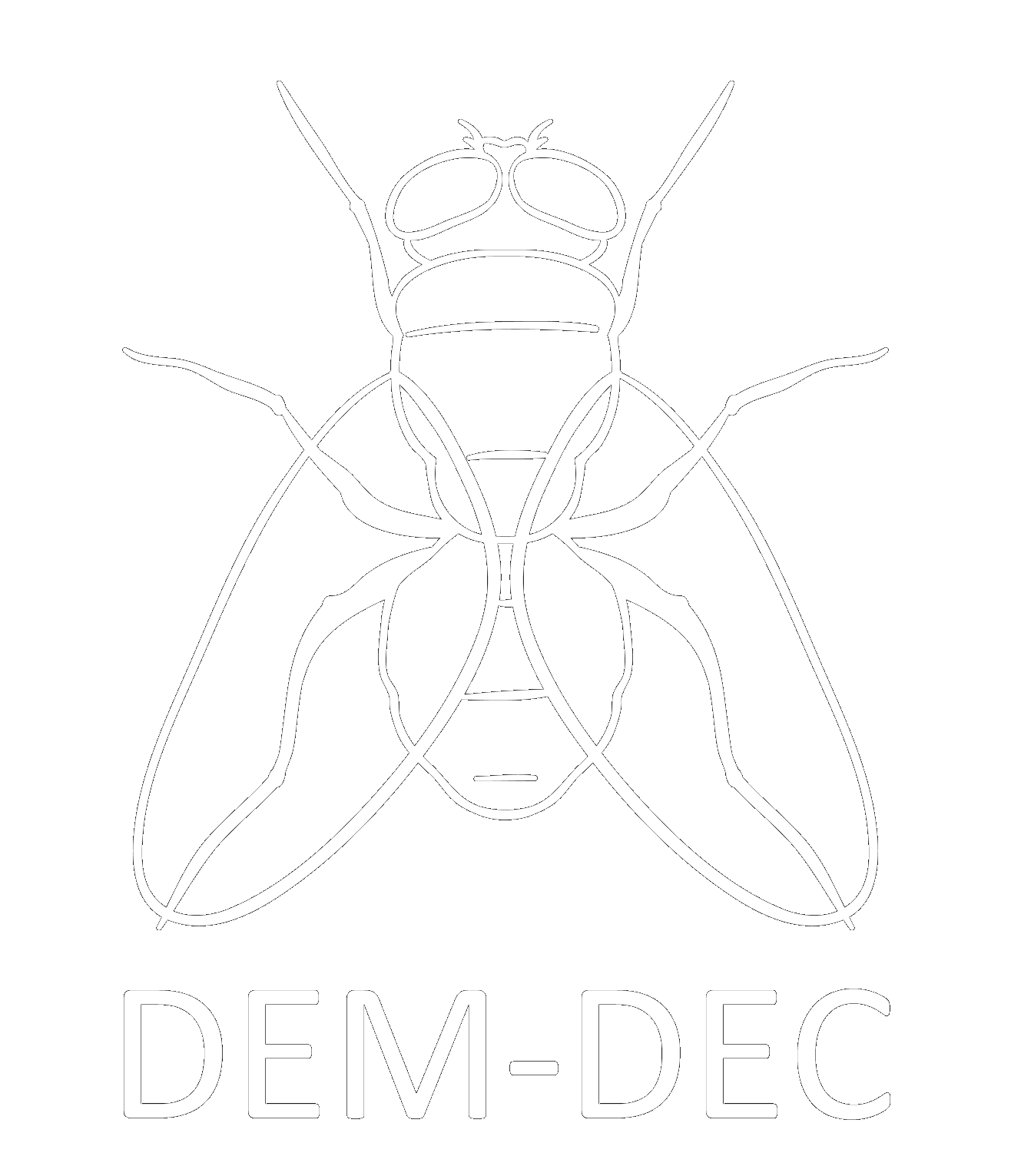



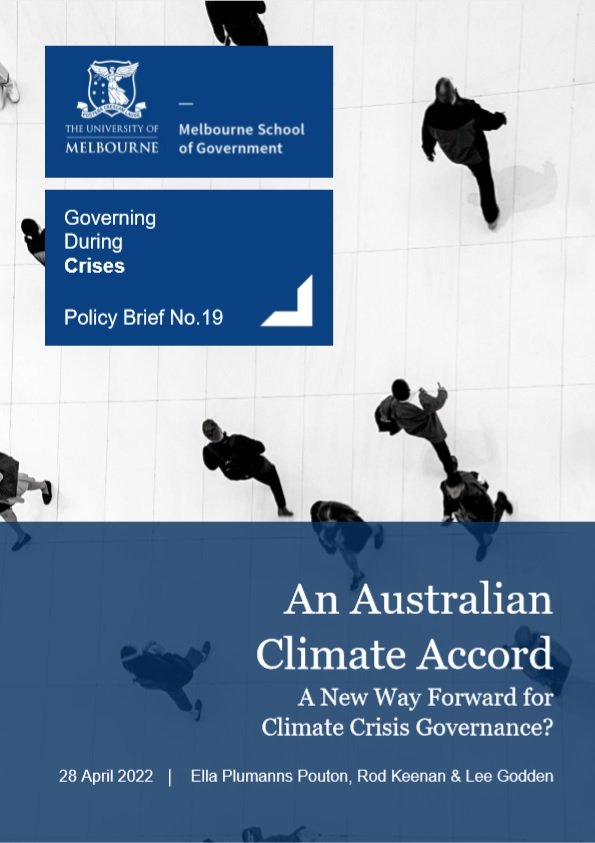






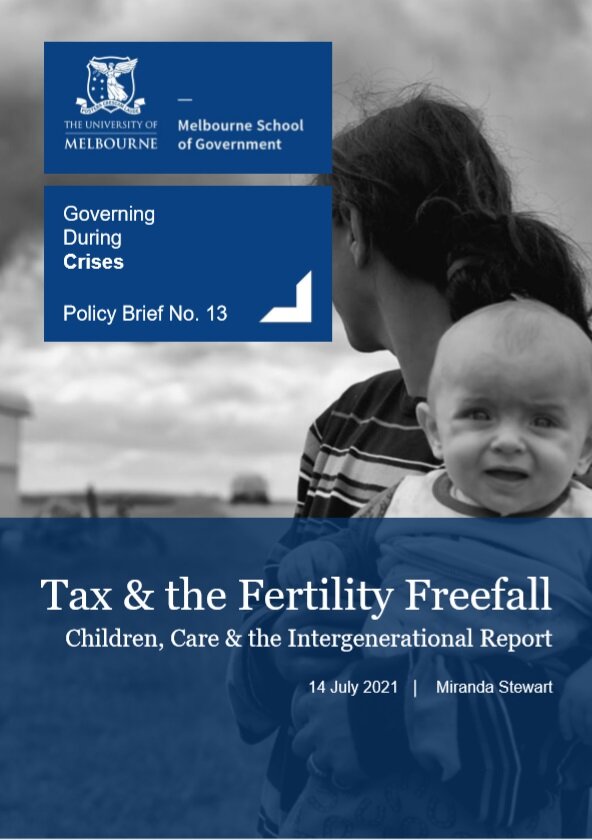


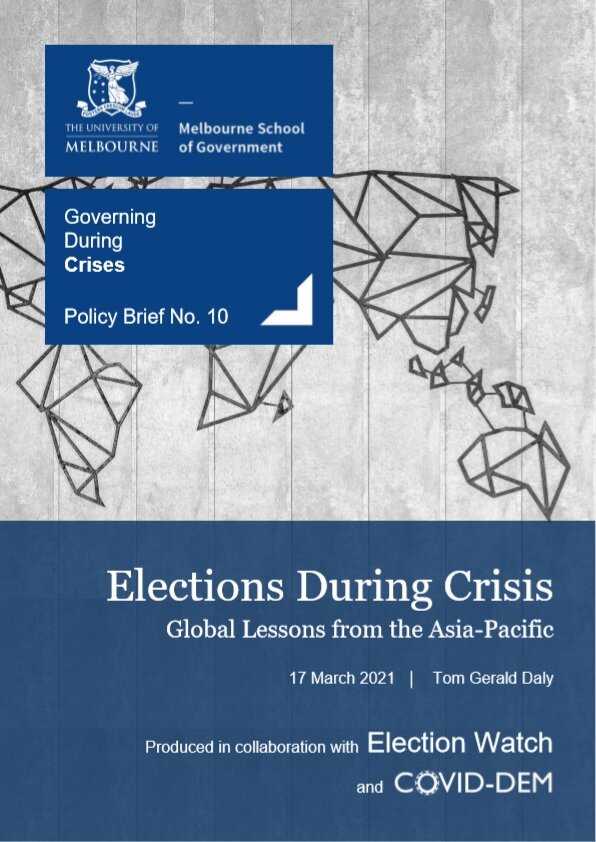



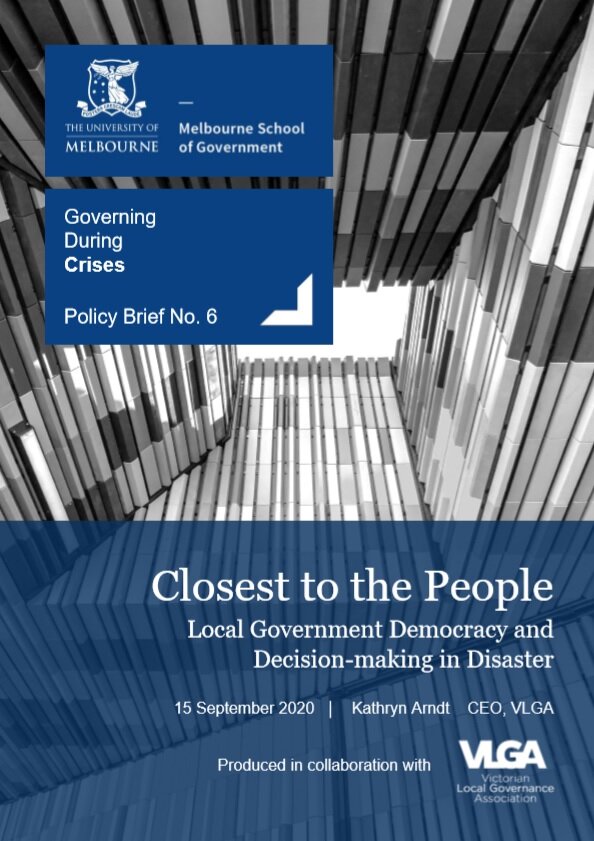


![GDC_PolBrief3_cover [final].jpg](https://images.squarespace-cdn.com/content/v1/5abb53e6372b9691939ac577/1596155494277-7HVVQNPPPI2MUEMEBKPP/GDC_PolBrief3_cover+%5Bfinal%5D.jpg)
![GDC_PolBrief2_cover [final].jpg](https://images.squarespace-cdn.com/content/v1/5abb53e6372b9691939ac577/1593414408320-BHEXE9WJMYG2TK85D165/GDC_PolBrief2_cover+%5Bfinal%5D.jpg)

